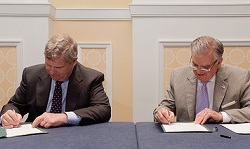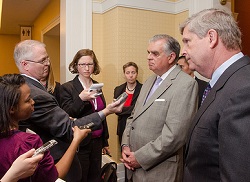 Two members of Pres. Obama’s cabinet today have signed their names to an agreement that will extend the administration’s commitment to the production of biofuels for use in airplanes. Secretary of Agriculture Tom Vilsack and Transportation Secretary Ray LaHood have extended by five years the “Farm to Fly” program, an initiative to partner the USDA and Federal Aviation Administration (FAA) to help develop a viable biofuel for the aviation industry.
Two members of Pres. Obama’s cabinet today have signed their names to an agreement that will extend the administration’s commitment to the production of biofuels for use in airplanes. Secretary of Agriculture Tom Vilsack and Transportation Secretary Ray LaHood have extended by five years the “Farm to Fly” program, an initiative to partner the USDA and Federal Aviation Administration (FAA) to help develop a viable biofuel for the aviation industry.
During remarks at the ceremony at the Advanced Biofuels Leadership Conference (ABLC) near Washington, D.C., Vilsack said this is a real job producer, especially for rural parts of the country.
“By continuing to work together to produce American made ‘drop-in’ aviation fuels from renewable feedstocks, we will create jobs and economic opportunity in rural America, lessen America’s reliance on foreign oil and develop a thriving biofuels industry that will benefit commercial and military enterprises,” Vilsack said. “USDA is pleased to partner with the FAA in our quest to develop alternatives to fossil-based fuel, which is critical to reducing carbon emissions and protecting the environment.”
LaHood pointed out that it’s been the hard work of people in attendance at the ABLC that made this agreement even a possibility.
“Through the use of sustainable alternative jet fuels, we are showing the world that we can come together to solve our greatest environmental challenges,” said LaHood.
 During a news conference after the signing, Vilsack said that while there are some that want to derail the renewable fuels industry through the destruction of programs such as the Renewable Fuels Standard (RFS), he remains one of biofuels’ biggest allies.
During a news conference after the signing, Vilsack said that while there are some that want to derail the renewable fuels industry through the destruction of programs such as the Renewable Fuels Standard (RFS), he remains one of biofuels’ biggest allies.
I asked Vilsack how they overcome objections from automakers who don’t approve of E15 for most cars on the road, and he bristled and remained steadfastly behind the studies that show it would work in model years 2001 and after.
“The testing would suggest that there would not be damage to the engines. And I think if consumers were given the option, consumers would choose [E15] because they want to be supportive of a domestic fuel industry.”
And while there might be some who dispute on how much renewable energy is saving consumers and creating jobs, Vilsack said there are some things that are crystal clear.
“I am positive consumers benefit from this. I am positive that hundreds of thousands of jobs are connected to this industry. And I am positive that it has stabilized farm income,” he said.
Listen to Vilsack and LaHood’s remarks here: Secs. Vilsack and LaHood at ABLC

